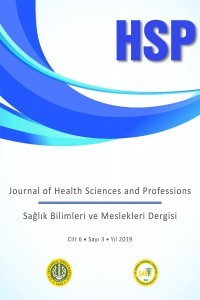Kadınların Maternal Bağlanma Algısı ve Anneliğe İlişkin Görüşleri / The Relationship between Maternal Attachment Perception of Women's Maternal Role
Maternal bağlanma algısı;annelik rolü ilişkisi; görüşler.
Women's Perception of Maternal Attachment and Their Views on Motherhood
___
- 11. Kavlak O, Şirin A. Maternal bağlanma ölçeği’nin türk toplumuna uyarlanması. Uluslararası İnsan Bilimleri Dergisi 2009;6:188-202.
- 12. Büyüköztürk Ş, Çakmak EK, Akgün ÖE, Karadeniz Ş, Demirel F. Bilimsel Araştırma Yöntemleri. Pegem Akademi, Ankara, 2012.
- 13. Lerum CW, LoBiondo-Wood G. The relationship of maternal age, quickening and physical symptoms of pregnancy to the development of maternal-fetal attachment. Birth 1989; 16(1):13-7.
- 14. Türkiye Nüfus Sağlık Araştırmaları. Sağlık Bakanlığı, Hacettepe Üniversitesi Nüfus Etütleri Enstitüsü, Macro İnternational İnc., Ankara, 2013.
- 15. Öztürk R, Saruhan A. 1-4 Aylık prematüre bebeği hastanede tedavi gören annelerin depresyon ve maternal bağlanma ilişkisinin incelenmesi. Hemşirelikte Araştırma Geliştirme Dergisi 2013;1:32-47.
- 16. Demirbaş H, Kadıoğlu H. Prenatal donemdeki kadınların gebeliğe uyumu ve ilişkili faktörler. MUSBED 2014;4(4):200-206.
- 17. Lindgren K. Relationships among maternal-fetal attachment, prenatal depression and health practices in pregnancy. Res Nurs Health 2001;24(3):203-217.
- 18. Lindgren K. A comparison of pregnancy health practices of women in inner-city and small urban communities. J Obstet Gynecol Neonatal Nurs 2003; 32(3):313-321.
- 19. Weis KL. Maternal Identity Formation in a Military Sample:A Longitudinal Perspectıve. Theses of Ph.D:University of North Carolina, 2006.
- 20. Özkan H, Kanbur A, Apay S, Kılıç m, Ağapınar S, Özorhan EY. Annelerin doğum sonu dönemde ebeveynlik davranışlarının değerlendirilmesi. Şişli Etfal Hastanesi Tıp Bülteni 2013;Cilt: 47 (3):117-121.
- 31. Yılmaz S, Beji N. Gebelerin stresle başa çıkma, depresyon ve prenatal bağlanma düzeyleri ve bunları etkileyen faktörler. Genel Tıp Derg. 2010; 20(3): 99-108.
- 32. Mercer R. Predictors of maternal role attaintment at one year post birth. West J Nurs Res. 1986; 8(1):2-9.
- 33. Ragozin A, Basham R, Crnic K, Greenberg M, Robinson N. Effects on maternal age on parenting role. Dev Psychol. 1982; 18: 627-634.
- 34. Ngai F, Chan S, Holroyd E. Chinese primiparous women’s experiences of early motherhood: factors affecting maternal role competence. J Clin Nurs. 2011; 20: 1481-1489.
- 35. Gager CT, McLanahan SS, Glei DA. Preparing for parenthood: Who’s Ready, Who is not? Center for Research on child Wellbeing Working Paper 1998;1-42.
- 36. Yarcheski A, Mahon NE , Yarcheski TJ , Hanks MM, Cannella BL. A meta-analytic study of predictors of maternal-fetal attachment. Int J Nurs Stud 2009;46(5):708–715.
- 37. Atalay S. Gebelikte depresyon prevalansının sosyodemografik özellikler, obstetrik risk faktörleri, kaygı düzeyi ve sosyal destek ile ilişkisi. Aile Hekimliği Uzmanlık Tezi: Hacettepe Üniversitesi; 1999.
- 38. Mermer G, Bilge A, Yücel U, Çeber E. Gebelik ve doğum sonrası dönemde sosyal destek algısı düzeylerinin incelenmesi. Psikiyatri hemşireliği dergisi - journal of psychiatric nursing 2010;1(2):71-76.
- 39. Inandi T, Bugdayci R, Dundar P, Sumer H, et al. Risk factors for depression in the first postnatal year: a Turkish study. Soc Psychiatry Psychiatr Epidemiol 2005;40:725-30.
- 40. Shin H, Kim YH. Maternal Attachment Inventory: psychometric evaluation of the Korean version. Journal of Adv Nurs 2007;59(3): 299–307.
- ISSN: 2148-7588
- Başlangıç: 2014
- Yayıncı: İstanbul Üniversitesi-Cerrahpaşa
Şizofreni Hastalığında Umut Kavramı / The Concept of Hope in Schizophrenia Disease
Özlem ŞAHİN ALTUN, Zeynep OLÇUN
Yasemin BAŞKAYA, Fatma Deniz SAYINER
Rukiye DOĞAN, Fatma Deniz SAYINER, Hüseyin Mete TANIR
Hastanede Çalışan Hemşirelerin İş Güvenliği / Occupational Safety of Nurses Working at the Hospital
Gülşen IŞIK, Nuray EĞELİOĞLU CETİŞLİ, Yasemin TOKEM, Dilan YILMAZ, Aylin İLHAN
Sağlık Bilimleri ve Meslekleri Dergisi Cilt 5 Sayı 1 2018
